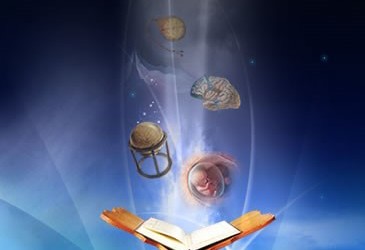
By Amar Guendouzi
Much ink is spilt nowadays to speak on Islam and Science, as if science has just popped up in front of the door of the Muslims begging to enter their wonderful world, or as if some believers have at last understood the ultimate meaning of our the Holy Koran, and found it in concordance with the latest discoveries in all scientific disciplines.
The sad reality is that the upsurge in Islam and Science studies hides our discomfort, not to say our loss, in front of the growing role that modern science, most of which coming from the West, plays in our daily life and in our perception of the world we live in. Definitely, it is not without a mixed feeling that one notices that religion, (the Koran and the Sunnah), is no longer the only source that explains to us the (hidden) working and significance of the human body and psyche, the world of Nature, and the universe. I say mixed feeling because one does not know where to stand between the two (competing) worldviews, that of Religion and that of Science, when the hermeneutic of the former is desperately archaic and the origin of the latter is profoundly secular.
The issue of Islam and Science is so complex and fraught with so many pitfalls that much of the literature in the field seems pointless. This judgment may be dismissive; yet, could it be otherwise? Is it necessary to remind that all titles bearing the catchy phrase “the scientific miracles of the Koran” are necessarily misleading, for the reason that Islam, which is first and foremost a faith supposedly revealed by God Almighty, and science, which is man-made discovery, cannot be put side by side, like two parallel lines that would cut at whim!
Can’t the promoters of ‘the Scientific Miracles in the Koran and Sunnah’ and the preachers who follow in their footsteps realize once and for all that a faith cannot, and should not, be put in perspective with a process of inquiry which is always suggesting, questioning, discovering, and evolving? Can’t they also understand that even what we call a ‘scientific truth’ is only one fact in an unfinished, ever-evolving and never stopping chain of relationships and ties? I’m afraid that this is the trivia of the debate, the simplest terms of the equation!
So, how to speak about Islam with Science?
When we speak of Islam together with Science, Muslim believers assume tacitly the following assumption: theoretically, in the absolute, Islam is the religion of God, the Creator of the universe, His revealed truth; as such, the facts of science which treat of the working of the matter and the whole universe cannot, should not, contradict, nor oppose, His sacred Word. Since both emanate from one and the same (divine) source, they have to (no, they must!) coincide!
A wishful thinking at best, a lazy attempt to co-opt science most of the time, this view holds only in the absolute, and would never stand epistemological examination, because our discussion of the issue can never involve a faith with a process, that is Islam per se with Science per se, but a religious knowledge with a scientific knowledge!
Knowledge is a more precise term than truth, because it is never neutral, nor transparent, nor even fully objective. In other words, by the din of philosophy, epistemology, and ideology, scientific discourse always constructs complex systems of knowledge. Therefore, a question arises: is the confrontation of religious knowledge with scientific knowledge a valid one?
To discuss this issue, let me remind that nowadays, in the postmodern West (i.e. “post-Darwinian” , “post-Freudian” and “post-Einsteinean” etc), they no longer believe in scientific knowledge the way the positivist utopians used to do during the 19th century. Scientific ‘truths’ are indeed always received with a pinch of skepticism! Why?
If we account for the process of production of knowledge, its archeology in the word of Michel Foucault, we would learn that it involves a lot more than a happy discovery. Indeed, every form of knowledge has a history, is constituted in given circumstances, and fulfills, still following Foucauldian thought, a political function.
Thus, in the American and European laboratories, when a scientific discovery is made, or when a scientific fact seems established, the results of the experiment or the object of discovery is mired to a chain of related facts and overtaken by a discursive process which makes it endorse the secular significance which is at the heart of the modern philosophy and epistemology in the West. In undergoing this process, the ‘fact or the discovery’ loses much of the significance that it might have had to the faithful Muslim, and endorses a hegemonic function.
What this picture teaches us is that, to paraphrase again Foucault, sciences are always enmeshed with social structures and political power. For knowledge always works to consolidate Power, and the latter, on its turn, always strives to produce systems of knowledge.
Therefore, as Muslim believers, we must learn to be the producers of knowledge, not the consumers of imported knowledge. Consuming knowledge can damage our faith. On the other side, by becoming producers of knowledge, we will hold possession, not of definite truths, but of the discourse over the facts of Nature and existence. And yes, this is the POWER in developing sciences; it’s the ability to enforce a worldview which is in intelligent harmony with one’s faith and culture.
References:
Foucault, Michel. The Archaeology of Knowledge. Trans. A. M. Sheridan Smith. 1969. London and New York: Routledge Classics, 2002 (reprinted 2007).
Gordon, Colin. Ed. Power/Knowledge: Selected Interviews and Other Writings 1972-1977 Michel Foucault. Trans. Colin Gordon, Leo Marshall, John Mepham, Kate Soper. New York: Pantheon Books, 1980.
*This article won the Science Writer’s Award. Contact us for more details. Message us on Facebook or Twitter.
You must be logged in to post a comment.